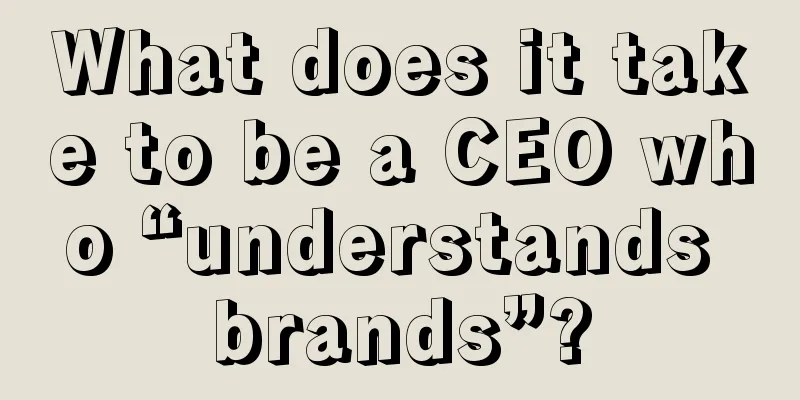What does it take to be a CEO who “understands brands”?

If you are a CEO, you can use this to evaluate whether you truly understand the brand. If you are someone who works with the CEO, you can also think back to whether you have encountered similar situations or problems in the process of dealing with the CEO. “A CEO who doesn’t understand brands will never find a brand director who does. A brand director who truly understands brands will definitely find a CEO who does understand brands.” This is a sentence I said before in a training and combat consulting project. It’s a bit like a tongue twister, but it aroused great response among CEOs. Let me explain. If a CEO doesn’t understand brands, he thinks it doesn’t matter whether he understands brands or not, as long as he can find a brand director who knows brands very well to take care of everything. Can this CEO find such a person? The answer is no. Because behind the brand is the entire strategy of the company. A brand director who can sort out the brand from strategy to execution details is already at a very high level, and he will not have to worry about offers. When a brand director has no worries about finding a job, he will have more options for screening. He will screen for a boss who really gives him opportunities, understands and recognizes the value of his work, gives him room to play and resources to support him, and screens out a boss who truly understands the brand. What I mean by a boss who truly understands brands is that he or she understands the principles of brands from the bottom of his or her heart and understands the importance of brands. He or she does not simply set marketing or sales goals for the brand director, nor does he or she regard brands as a short-term means of packaging the company. He or she can sit down and talk to the brand director about the brand value, spirit, strategic ownership, future planning, the importance of brands in the company, and the authority of the brand director. Gradually, capable and brand-savvy brand directors who work under CEOs who don’t understand brands will eventually find a CEO who understands brands and is a good match for them. 1. CEO Illustrated Book1. The CEO Who “Doesn’t Know What He Knows”Some time ago, I visited a company that makes CNC systems. This company is very large. During the conversation, their boss never mentioned words like brand and culture. He always talked about strategy. Later, I found that the strategy he was talking about was very broad, and it included brand, culture, and so on. He would personally take the lead in making the company's internal publications and manuals for customers. In the publications, he invited many customers, investors, and company-related personnel to tell their stories about the company; at the same time, he invited the company's second-party and third-party companies, and even former employees to talk about their feelings about the company. Putting the comments of former employees and third-party outsourcing companies into the brochure fully reflects the sincerity and respect of this company. This practice is what I said before, that is, try to make everyone your own, make more friends and fewer "enemies". Do you think this CEO understands branding? I think he definitely understands it, but he didn't express it in professional brand language, and he didn't know that he knew it. 2. The CEO who “doesn’t know what he doesn’t know”Recently, the CEO of another company told me that he was very busy and had no time to think about branding. He had to spend a lot of time every day researching strategies, finding people, and finding money. But the people he liked were always reluctant to join his company. In order to influence the other party, the CEO talked a lot about benefits. He felt very painful in the process of constantly negotiating and pulling with the candidates. He always thinks that he should wait until he has money, people and sales to talk about branding. This CEO seems to understand branding, but in fact, if he builds a brand just to become bigger and stronger, to survive, without a firm desire in his heart, he may become more and more anxious in the future. 3.|Caring CEOHe may not have achieved a large scale yet, but he has ideals and visions that come from his beliefs. When he has firm beliefs, he can use them to attract talents. "Although the company does not have a lot of money at this stage, we are very wealthy. Would you like to join us and do this fun thing together?" With this mentality, it will be easier to find people and money. Everyone has a desire for the strong. Money and people do not appear because they are needed, but because they have a purpose. "Think about it, I can participate in something like this, then my life is pretty cool." This is the heart, not just the brain. 2. Why do we build a brand?After talking about these types of CEOs, let us return to the question: why do we build a brand? A brand is actually a filter that can help you select things that match your values. For example, in our last training and combat consulting project, there was a general manager from Yishun Children's Wear. He said that you may think that the Yishun brand has disappeared, but Yishun Children's Wear sells nearly 2 billion a year, which surprised us. He said, "We sell very well in some counties in China, such as Ling County, Chongqing, and we are the sales king in the local area. We don't do e-commerce, and we never open online Tmall stores or JD stores..." The decision they made was to give up big cities and e-commerce, and they achieved very impressive sales. This gives us an inspiration that sometimes, subtraction itself results in addition. The development of Internet e-commerce in the past decade has, to some extent, been quite harmful to business. Excessive quantitative thinking has led many people to expand for the sake of expansion and to expand stores for the sake of expansion. Some marketing on the market is disturbing you and robbing you, rather than attracting you. It causes you physiological stimulation, and this stimulation is by no means to impress high-end consumer groups or consumers' minds. It may impress the senses and curiosity, but these things are also easily worn out. Something that is not lasting is of no value to a business, and something that is worthless is not worth cultivating for a long time. Brand is something that can bring lasting value to a company. Of course, if you have the opportunity to get a more reasonable amount of traffic, that's great. However, don't sell your soul for the so-called traffic, don't sell your original intention for the traffic. I think the starting point of a CEO is the most valuable thing for a company. 3. What will happen if you don’t build a brand?1. Cause mistakes in selecting peopleMost companies have a set of standards for recruitment. I have watched many companies’ human resources recruitments and found that their entire process lacks any assessment or guidance on candidates’ brand preferences, values, and culture. In other words, they go through an industrialized recruitment process and screen out people who match the data. However, a CEO who really cares about the brand and recruiting people will definitely be aware of using his heart to impress people, and he will consciously screen and evaluate people based on culture. The benefit of this is that the company's management costs will be greatly reduced. Suppose some people in the company are harsh, defensive, and like to blame others, while others are very open and selfless to others. This can easily cause conflicts. In this case, the company's management costs will become higher, and the essence of this consequence is still because of the lack of attention to the brand. 2. Causes waste of moneyWhy is it said that if you don’t understand branding, your company will definitely spend money? Let me give you another example. During the renovation process of a certain company, they made a lot of detailed budgets and compared various design studios. Then they found that they needed a brand new exhibition hall and the original exhibition hall had to be overturned and redone. In this way, the original exhibition hall construction costs were wasted, and the company’s supporting booth design, brochures and cultural derivatives also had to be updated accordingly... It seems to be a careful calculation, but after going through the whole process, an astronomical amount of money was wasted. If the CEO had a little awareness of branding first, this money would not be wasted at all. 3. Lack of motivation to createWhat is the difference between creativity and creation? When we talk about a person being creative, many people may think that it refers to a person who has a lot of ideas and a lot of ideas. Regarding this point, I specifically went to Shuowenjiezi to look up the origin of the word "造". I chose several core explanations: "造" can mean merit, achievement, and contribution; "造" is a long-term and continuous labor process; "造" also represents a belief in something, and the ability to build and produce it without fear of trouble. From the characteristics of the word "造", everyone will understand that creative people and creative people are two completely different types of people. To be creative, you must be able to endure loneliness. So what can sustain our creativity and achieve the so-called long-term value? It is the brand, the spirit, the concept and the culture. Only these things can help you get through the pain of time and the difficulty of creation. Creativity and creativity, I think many people don't know the basic difference between the two. Some companies spend a lot of time on creativity, but they actually lack ambition. So when they do things, they rely on being clever to pursue fame and fortune. I'm not saying that this is not okay, but it will be painful to do things this way, and it will also be painful for the people who collaborate with you. I think that when running a business, you still need to have a bigger ambition, and you can't always do those bling bling things that can be done overnight. Therefore, we need to learn about brands, study the systems behind brands, and thoroughly understand brands. We are doing this training and combat consulting project and the experience camp project, in fact, we want to bring together people who are committed to doing this. I often tell everyone that you should stick together, and when you stick together, your mental strength will become stronger, because you know that you are not fighting alone in this world. 4. Lack of principles and values in managementI have seen some large companies that manage based on tools. Tools are indeed very important, but now people are too superstitious about tools. Don’t forget that tools are used by people, not to enslave people, and they are not the principles and values we rely on for management. We always rely on what kind of people we are with and what kind of things we want to do. In management, sometimes there are some principles: How do we manage this company? Where should we spend our money and where should we not spend it? Who should we choose and who should we not choose? Who should be rewarded and who should be punished? These things are called management. The basis of these management must not be tools, efficiency, or immediate interests, but a principle and value basis that you all agree on. 4. How do you determine whether you or your CEO understands branding?So, how do you tell if a CEO understands brands? I have summarized several characteristics. 1. Does he have a soft spot in his heart?This CEO may be swift and decisive in his actions, but there must be a soft spot in his heart. He must believe in something, even if he doesn't say it, even if he doesn't show it in his actions, even if he doesn't understand it, but at least there must be a clean, soft, and clear spot in his heart. This determines that he is likely to believe in the humanity between people. If he is super rational and "inhumane", then it may not be appropriate to talk to him about brands in the short term. So, I think the first characteristic is to see if he has a little bit of softness, or whether he has been moved to tears by something. This is a very important indicator. 2. What does he use to attract others?If a CEO always talks about "how much do you want", "how much money can I give you", or "what position do you want", "come, let's ring the bell to go public" when recruiting or attracting people, he is making friends with others for the sake of profit. This is just a direction that everyone can observe. If you are a CEO, you can also think about how you usually behave and whether you subconsciously do such things to attract people. 3. Is he obsessed with creativity or creation?Some CEOs always say they are creative. In fact, it is easy to be creative, but it is very difficult to be creative. It is easy to be a shining person, but a truly creative person needs to be able to endure loneliness, have long-term perseverance, and believe in something. So what is the standard for distinguishing whether a CEO is obsessed with creativity or creation? It is that he has feelings for things with long-term value. 4. How he spends his money and timeYou can see if the CEO spends his money in a very logical way. Does he approve each payment with a frown? Or does he have his own logic and method in spending his money? To be honest, when we do training and combat consulting projects, some people will say, "Teacher Li, if you advertise, many people will sign up." But I am particularly afraid that you will let him come, and he will pay the money, but he will say, "Sorry, I have other things to do during the class time you requested, so I can't come." I am more frustrated that he has no time than he is not interested at all, because I think I have found the wrong person, he is unwilling to spend time on this matter, and sometimes unwillingness to spend time is more terrible than unwillingness to spend money. He even said, "I will give you this money, but I don't go, okay?" That is also very terrible, because it shows that he is unwilling to face this matter. When he thinks about this matter, he naturally avoids it, or in his mind there are bigger things than this matter. So, you can also judge where you or your CEO spend more time and money. 5. What kind of management logic does he have?What are the values of many companies we see now? It is called "success for customers". Of course, this is not to say that this value is bad, but I found that companies that use this tone as their value rarely succeed. Because they don't put their values into their hearts, but use their brains every day. After they use their brains, they tend to shout slogans, but once they shout slogans, the slogans will fail. Slogans are not something that is shouted, but engraved in the heart. Some companies don't have this slogan, but they just do it, and you can feel it. When I study a company, I often like to go offline and see everyone in the company, their facial expressions, whether their employees are particularly twisted and uncomfortable in this company, or whether they are very smooth. This is actually a reflection of whether they have a brand. It may not be summarized into words, or it may not be turned into a brand slogan. This is not important, but they have this thing. 6. Does he have the top-level framework capabilities?Of course, the reason why CEOs become CEOs is that they must have some top-level framework capabilities. However, the top-level framework capabilities of brands are completely different from the framework capabilities of business model design and financial model design. The latter requires a rational framework design capability, but branding requires a heartfelt, emotional, right-brain framework thinking design capability. Many CEOs I have met lack this ability. Sometimes we find that the CEO can’t get into the conversation with his brand director. The brand director wants to talk about something emotional that can convince the boss, but the CEO always seems anxious and only listens to rational, quantifiable explanations. In the end, the brand director had to say: “Boss, last month you gave me 10,000 marketing fees, and I got you 20,000 customers.” If your CEO doesn't talk to you about things that are a little bit more interesting, you may need to reflect on whether he doesn't have it or doesn't want to talk to you. If not, then you should quickly find someone else. If he doesn't talk to you, then it means that there is something wrong with you. In his judgment criteria, he thinks you don't understand, and he thinks you are not qualified to talk to him about this matter. Then you really need to send him to me to talk to me. Let's see whether he "knows that he doesn't know", "doesn't know that he doesn't know", or "doesn't know that he knows"? Author: Li Qian WeChat public account: Li Qian Talks about Brands (ID:liaotian78), founder of Guanxi Brand Agency and former managing director of Qingshan Capital. |
<<: There are three levels of business analysis. What does the most powerful one look like?
>>: The same product has different prices, why is it still selling well?
Recommend
What skills should new Shopee sellers master?
E-commerce business is not so easy to do, especial...
How are Amazon removal fees calculated? Which products are restricted?
For Amazon sellers, there are many fees to pay, in...
Is it considered drunk driving if you drink Luckin Coffee’s new Moutai product and drive?
On September 4, the Maotai-Luckin Coffee-produced ...
Xiaohongshu "Star" Rise
In the live streaming boom, how can each platform ...
Can the domain name still be used after Shopify closes the store? How to avoid it?
After we open a store on Shopify, we must abide by...
"Second-hand products" are popular, and second-hand luxury merchants have created live broadcast rooms for popular products in batches
"It's not that I can't afford it in t...
How often should Amazon listings be optimized? How long does it take to see results after optimization?
On the Amazon platform, optimizing listings is the...
In the AIGC era, how to strike a balance and measure?
Introduction: Using AI to make videos? With the pr...
Is the refund rate on Shopee high? Is it okay if I don't agree to a refund?
Because now everyone doing e-commerce needs to use...
Shopee will suspend logistics incentives for sellers in non-free pickup areas from October
Shopee platform launched a logistics incentive pla...
Seven thoughts on branding in marketing
Many brands actually lack consistency in the proce...
Brand No. 1, don’t forget the basic probability when building a brand
Nowadays, there are more and more new consumer bra...
The longest Double 11 in history, the e-commerce war enters a new stage
This year's Double 11 Shopping Festival not on...
How often should I pay VAT on Amazon Europe? How should I declare it?
Nowadays, many merchants who open stores on Amazon...
In order to get the freedom to wash, cut and blow dry, young people force themselves to become "Tony"
Nowadays, haircuts and hairdressing are always dau...









